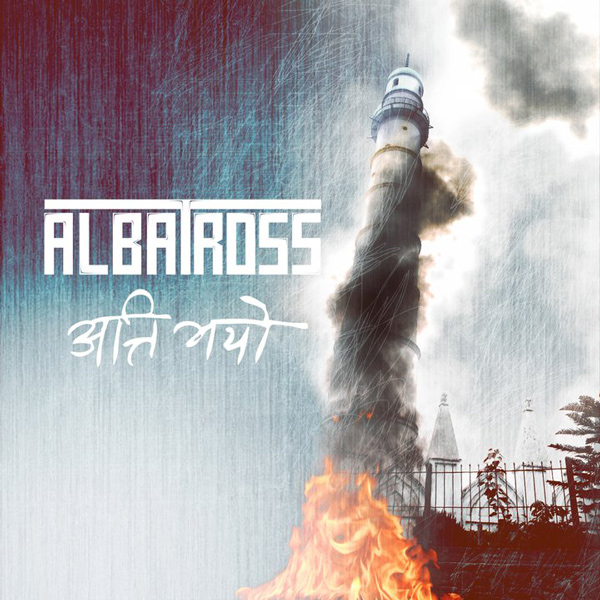— Apoorva Lal
‘Atti Bhayo’, the third studio album by the popular Nepali rock outfit Albatross, is an attempt by the band members to vent out their frustrations at all levels ‘from those in personal relationships to those which ail the entire nation. It is a sincere piece of work and has some very interesting tracks. The quality of the musicianship on the album is high, and there are some songs that are likely to garner many listens. However, the album is rather inconsistent because of some less-than-memorable tracks and some unnatural and forced sounding material. It also suffers from a serious lack of experimentation, resulting in music that is pleasant when heard and pleasantly forgotten. However despite some of these elements that depress the quality of the album, this is still a solid piece of work and the quality and energy that Albatross bring to this album and their live performances have turned them into a respected name in the Nepali rock scene.
Songwriting on this album is fairly straightforward because of the theme; songs do not linger on abstraction and instead vent out frustration in simple words and phrases. A good example of this would be the song ‘Chaina’ (which was also released as a music video on youtube.) It received a pretty positive response, in which vocalist Shirish Dali shouts ‘Chaina, kehi nai chaina’ (Nothing, there is nothing). However, because of the straightforward songwriting, lyrics are seldom poetic and memorable.
The quality of individual songs fluctuate, making the album an unpredictable and not totally gratifying ride. Some tracks like ‘Shristi ra Drishti’ and ‘Chaina’ sound excellent from the very first listen. ‘Shristi ra Drishti’ has a dynamic intro section that seems to flow and merge seamlessly into a well sung verse and chorus. The acoustic guitar-work on this song is especially notable on this track because of interesting rhythm playing and creative harmonisation between the electric and acoustic guitars throughout the song. The wah-pedal solo in which guitarist Sunny Manandhar uses his guitar cable as an instrument is very innovative and clearly shows his Morello influences. ‘Chaina’ is an anthem that contains a powerful chorus and a lot of aggression. On the other hand, some tracks like ‘Nischal’ start off very well with a melodic intro but are spoilt by vocals that sound extremely unnatural and clearly quite forced (and somewhat constipated). Despite the unnatural vocal dynamics, the guitar-work on the track is quite noteworthy; it contains sections with Manandhar’s tasteful fills and arpeggios as well as a melodic chord progression played on the acoustic.
In stark contrast to some of these original and memorable songs, some songs clearly sound heavily influenced and fail to make an impression. The song ‘Janata ma Appeal’ (which contains lyrics by Bhimnidhi Tiwari) is so heavily influenced by Rage Against The Machine that the band’s originality seems to be compromised. Another RATM influenced song, ‘Kahile Kahi’, is the most forgettable song in the album. Its attempts at sounding dynamic and funky, ends up sounding inane and is problematic due to stiff vocals. ‘Abhiman’, has an intro that starts off well until some completely irrelevant volume swells (one of the rare instances where Sunny Manandhar’s lead guitar work seems quite off) spoil the fun. The latter part of the song, and another similar track called ‘Jhariko Raat’ are rather mundane. The lack of consistency, quite apparent from the very first listen, does serious damage to the listener’s overall response to the album.
The musicianship on the album is solid, and reinforces the fact that Albatross is a tight rock outfit. The guitar-work on the album is especially noteworthy, with Sunny Manadhar’s innovative electric guitar blending nicely with Shirish Dali’s tasteful acoustic playing. Manandhar uses the wah-wah pedal to excellent effect in many sections, and has a good guitar tone that adds a great deal to the album’s overall sound. His riffing is solid too, although the guitar tone seems to have been deliberately lulled because it visibly lacks meat in certain songs (The intro to ‘Janata Ma Appeal’, for example, sounds much better live, because it’s much more aggressive and distorted). Rhythm sections and harmonisation between the electric and acoustic guitars is noteworthy. The acoustic guitar is used very widely on this album, perhaps more widely than any other Albatross album. This adds a great deal of texture to the music, although it still is nothing out of the ordinary. Some heavier riffing (closer to the Hi-Fly era material) would be welcomed by many fans who have perceived the gradual mellowing of Albatross’s sound as the Nepali equivalent of Metallica’s ‘selling-out’.
The bass and drums are solid but quite inconspicuous. Some more experimentation with more dynamic drumming and bass sections would do a lot of good in any subsequent albums. Shirish Dali’s vocals are very inconsistent ‘sometimes they sound great and sound absolutely horrid at other times. The problem lies in the lack of conviction that is quite apparent in parts where he is supposed to show aggression and anguish. And for an album that is based on these very feelings, half-hearted sounding vocals don’t really do much good to the band’s cause. The band experiments with dual harmonised vocals in many sections, most notably in the opening track ‘Maa’, and uses it to mediocre effect. The voices of the lead and backing vocalist do not gel, and the result is likely to receive only lukewarm appreciation.
Overall, the album is a mixed bag and listeners are sure to be disappointed if they want an album that is gripping from the first minute onwards. It yields a couple of excellent songs, a couple of cool songs that you enjoy while listening and are likely to forget later, and a couple that you will definitely not want to go back to and listen to again. Albatross’s dedication and perseverance is admirable; they have kept going while most bands of their days have long since disbanded and disappeared. They have continued writing good material, but the quality of their material has been quite inconsistent and ‘Atti Bhayo’ is a confirmation of this fact.
What is promising is that they can still write good songs and continue performing live and touring with the intensity that is unparalleled in the Nepali scene. However, that being said, Albatross need to experiment more and work for longer in order to make their next album more memorable than ‘Atti Bhayo’. They need to write more dynamic songs and keep pushing their own boundaries so that each new album widens the band’s horizons. ‘Atti Bhayo’ falls well short of that, and one can only hope that the next album will contain songs that are more interesting, experimental and memorable. After all, they definitely wouldn’t want to be called the ‘Farki Farki band’ throughout their career.

